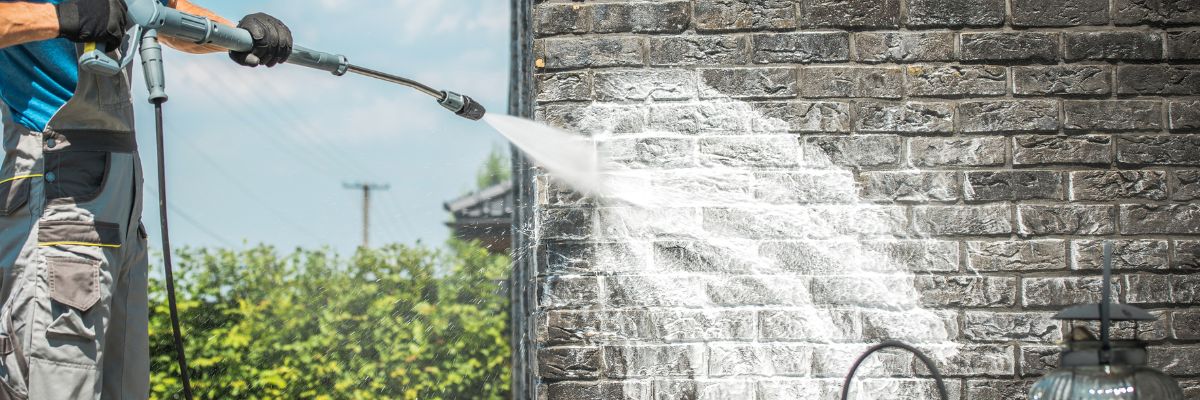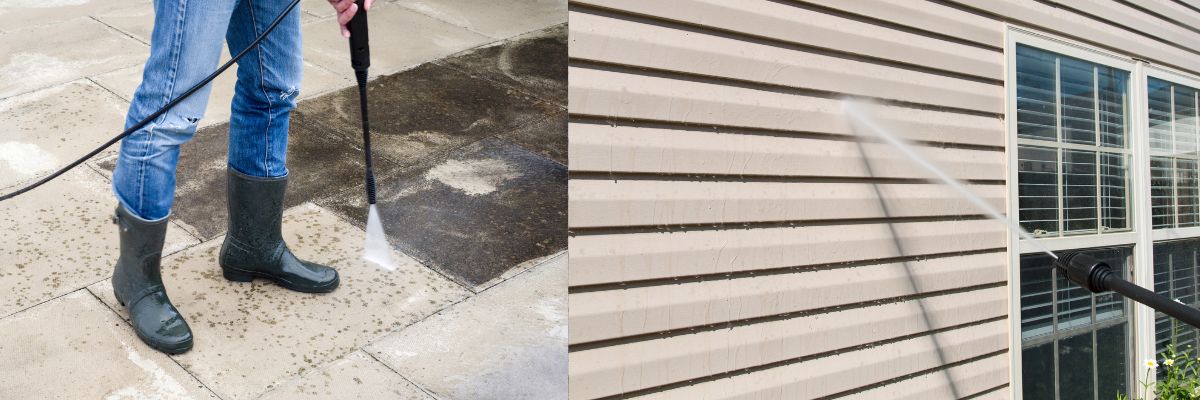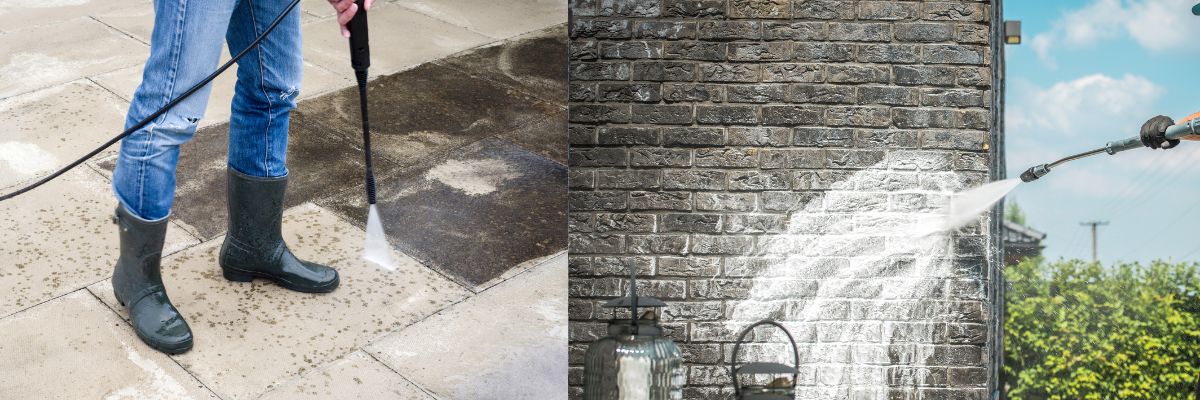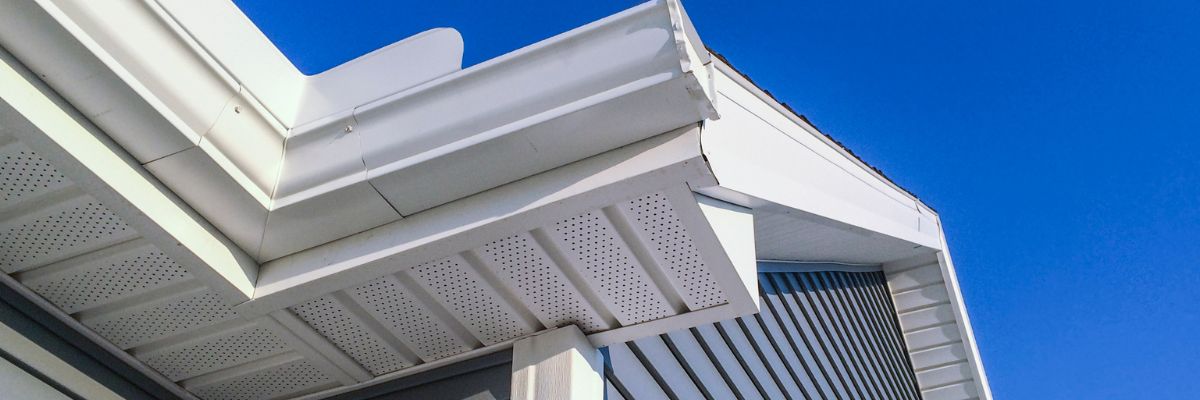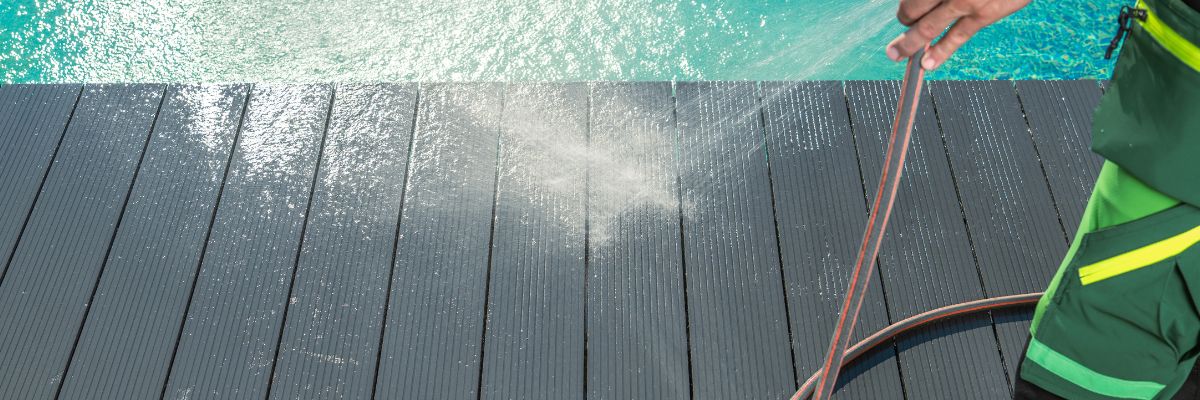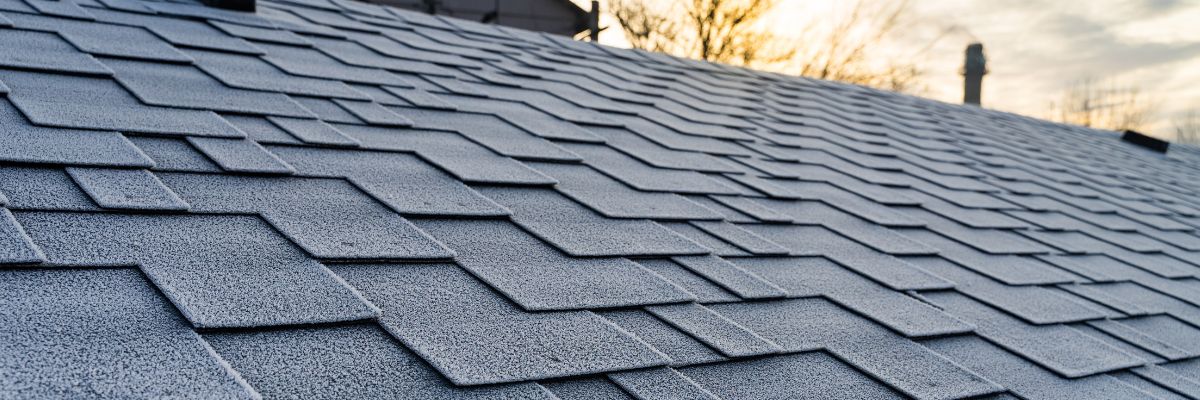No, it is recommended to not pressure wash a composite roof, they’re not built to withstand the intense force of pressure washing. While blasting away grime with a pressure washer might seem like a quick solution, it often causes far more harm than good.
Below, we’ll explore why pressure washing a composite roof is not recommended, the damage it can cause, and what safer alternatives you should consider to keep your roof clean without compromising its integrity.

Composite Granule Loss and Shingle Damage
The Protective Layer is Essential
Composite shingles are coated with tiny granules that serve an important purpose: they protect the asphalt layer underneath from ultraviolet (UV) rays and physical wear. These granules are essential for the longevity and performance of the roof.
When high-pressure water strikes the surface, it can strip these granules away in seconds. This leaves the shingles exposed to sun damage, which accelerates aging and increases the likelihood of cracking, curling, or blistering. The loss of granules isn’t just cosmetic—it significantly reduces the life expectancy of the entire roofing system.
Shingles Can Become Loose or Dislodged
In addition to stripping granules, pressure washing can loosen or completely dislodge shingles. Composite shingles are designed to lay flat and overlap to create a watertight seal. The strong force of a pressure washer, especially at close range, can lift or remove these shingles altogether.
Once shingles are displaced, it opens the roof to a number of issues: water infiltration, wind damage, and a weakened structure that can’t properly protect your home. This kind of damage often goes unnoticed until it results in costly repairs.
Voiding Manufacturer Warranties
Pressure Washing May Cost You Coverage
Most major roofing manufacturers specifically advise against pressure washing asphalt shingle roofs. In fact, using a pressure washer on your roof can void your product warranty entirely.
Warranties are designed to protect homeowners against premature product failure, but they also come with certain terms and conditions. Improper maintenance—like pressure washing—is considered misuse, and any resulting damage is typically not covered. That means if your shingles begin to fail prematurely after pressure washing, you’ll be left footing the bill for repairs or replacement.
Professional Maintenance is Required
To maintain warranty coverage, manufacturers often recommend professional cleaning services that use approved methods. These methods focus on low-pressure water or chemical treatments that clean the roof without compromising its structure or appearance.
Water Infiltration Risks
Pressure Can Force Water Under Shingles
One of the biggest hidden dangers of pressure washing is the potential for water infiltration. Composite shingles are designed to shed water down the roof slope—not to handle water being blasted up under their edges. When pressure is applied at the wrong angle or too forcefully, water can get underneath the shingles.
This creates a chain reaction of problems: the roof’s underlayment becomes saturated, decking materials begin to warp, and eventually, moisture finds its way into the attic or ceiling below. Once inside, water can cause mold, mildew, and structural rot that’s expensive to remediate.
Damage Isn’t Always Immediately Visible
What makes water infiltration especially dangerous is that it doesn’t always show immediate symptoms. You might not notice any leaks or visible issues until weeks or months later. By then, the damage is well underway—and so is the repair bill.
How To Safely Clean A Composite Roof
Soft washing is widely considered the safest and most effective way to clean a composite roof, as well as tile, slate and shingle. This method uses a low-pressure water system combined with biodegradable cleaning agents that break down dirt, moss, algae, and mildew. Unlike pressure washing, soft washing doesn’t rely on brute force. Instead, it chemically treats the surface, allowing the growth to die off and be gently rinsed away.
Soft washing not only preserves the granules and structural integrity of the shingles, but it’s also compliant with most roofing manufacturer guidelines. This makes it a smart choice for homeowners looking to clean their roof without voiding warranties or risking damage.
Chemical Treatments That Work Over Time
In some cases, chemical treatments can be applied without even needing a rinse. Products like sodium percarbonate or specially formulated roof cleaners work over time to break down organic growth like lichen and algae. After application, rain naturally washes the residue away over the coming weeks.
These treatments are especially useful for preventing regrowth, as many contain inhibitors that keep moss and algae from returning. Best of all, they require no scrubbing or high-pressure application—just even distribution and a little patience.
Manual Cleaning for Spot Treatment
If only small areas of the roof are affected, manual cleaning may be a practical option. Using a soft-bristled brush, a garden hose, and a mild cleaning solution (like diluted vinegar or soap), you can treat localized areas without putting the entire roof at risk.
This approach is best used for small patches of moss or debris buildup and should be done with extreme caution. Never walk directly on composite shingles without proper safety equipment, and avoid scrubbing too aggressively, which can also loosen granules.
The Bottom Line: Don’t Pressure Wash Composite Roofs
Composite asphalt shingles are designed for durability, but they aren’t built to withstand the intense force of pressure washing. High-pressure cleaning can strip away protective granules, dislodge shingles, void manufacturer warranties, and even force water underneath the roof system—leading to costly internal damage. Simply put, pressure washing poses too many risks to be considered a safe option for composite roofs.
Instead, the best choice is to rely on safer, proven methods like soft washing, eco-friendly chemical treatments, or gentle manual cleaning. These techniques are designed to clean effectively without compromising the structure or performance of your roof.
Keeping your roof clean shouldn’t mean putting it at risk. That’s why Vesta Pro Wash offers professional composite roof cleaning using low-pressure soft wash systems that are safe, manufacturer-approved, and highly effective. Whether you’re dealing with algae, moss, or years of built-up grime, our team has the tools and experience to restore your roof’s look while protecting your investment.
Call Vesta Pro Wash today for a free consultation and let us help you maintain a clean, healthy roof—without the damage.



